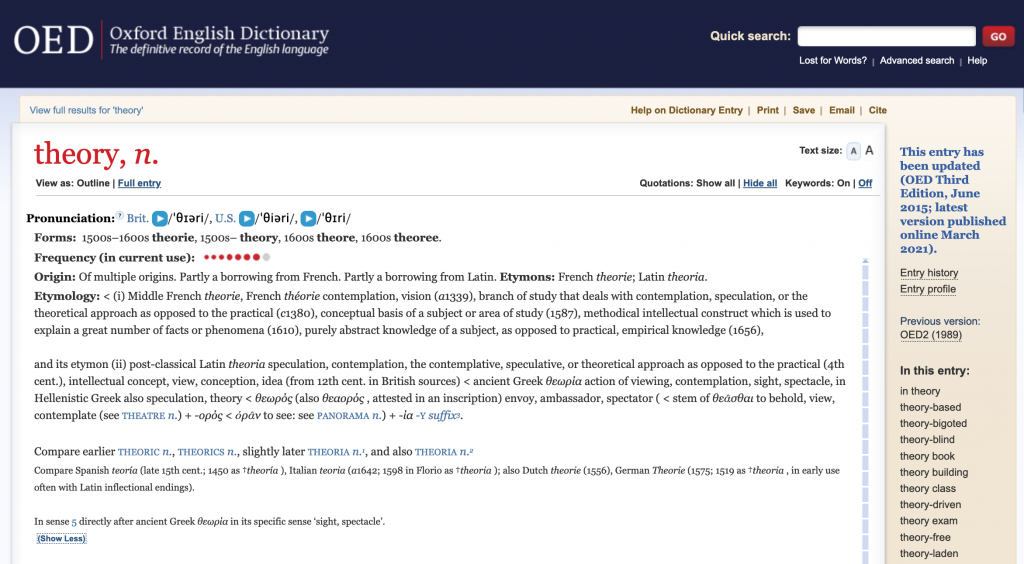 Often in the study of religion you’ll hear people saying things like “I don’t do theory” (yes, there’s often an emphasis on the verb, akin to saying “I don’t do [insert something with which you disagree or dislike]) or maybe you’ll come across a conversation on when to introduce theory to undergraduate students — right from their first course or, fearing that will alienate them from the field, only doing so later, “once they’ve already got the basics,” as some will say.
Often in the study of religion you’ll hear people saying things like “I don’t do theory” (yes, there’s often an emphasis on the verb, akin to saying “I don’t do [insert something with which you disagree or dislike]) or maybe you’ll come across a conversation on when to introduce theory to undergraduate students — right from their first course or, fearing that will alienate them from the field, only doing so later, “once they’ve already got the basics,” as some will say.
There’s a real conservatism embedded here that’s tough for some to see, what with the prominence of assuming that, for good or ill, there’s a variety of discrete things in the world that are just naturally called religions, comprising the defining trait of different groups of people who all interact in various ways with each other or their surrounding circumstances. And so, studying those traits, their expression, and those interactions constitutes the study of religion — at least for some.
Given that for many in the academy today the idea of gender is increasingly accepted as a social construct through and through (with plenty of practical effects, no doubt), I find it to be a helpful analogy to think through just what a scholar of religion is saying when claiming that they “don’t do theory” or when arguing for the introduction of theory only later in the study of religion.
For such a position strikes me as similar to arguing for lower level courses in such things as “the natural differences between men and women” and, once these descriptive details were carefully learned in the first year or two of classes, only then moving the smaller group of more senior students who stuck with the program of study toward thinking about how the very ideas of gender or even sex were not only ideas with histories and implications of their own but how they also enabled those earlier courses to be taught to them along with the picture of the world that those courses presupposed and then reproduced.
But I’m guessing that’s not how most gender studies scholars would approach their topic — especially if their intro course was (as is so often the case in the Humanities) the only class in the topic that most enrolled in the course would ever take.
Instead, I’m guessing that, being careful to take into account the students’ own placement within a specific gendered ideology, many such intro courses would aim to use those experiences as the basis for inviting students to ask what at first might seem to be some pretty counterintuitive (and, yes, maybe even uncomfortable) questions — questions that would then be shown to have wide application and which could therefore be studied in a variety of situations (the detailed study of which would require students to learn all sorts of historical and ethnographic information, to be sure).
But that’s not how the study of religion often works.
What’s curious, then, is how differently the word “theory” is used in each case. For while in gender studies it can often mean a second-order discourse on the topic’s own conditions of possibility and implications, in the study of religion it often means a secondary step that works with the descriptive given of religion — what (as I’ve written before) a onetime doctoral committee member likened to a snowblower that helps you move around the snow. Theory, in this latter model, helps you to work with the religion that’s already there (such as interpreting its meaning correctly). But in the prior sense, theory scrutinizes why we think it’s there in the first place, studying how and why we create and perpetuate it.
And that’s why I think a reticence to “do” theory signals a conservative position, inasmuch as it conserves a particular set of assumptions about the world, aiming only to work within the parameters that those assumptions establish — while yet others in the field are aiming to historicize those very conditions, no differently than what many colleagues in adjacent fields are game to do in their research and in their teaching.
After all those mere descriptions of myths and rituals and traditions that come with the still dominant world religions intro course are not disinterested statements of fact, right…?